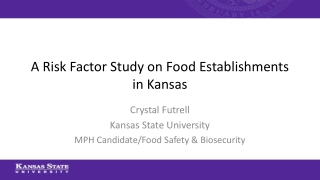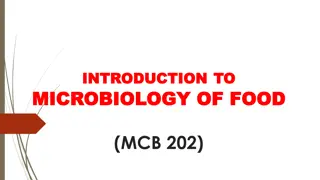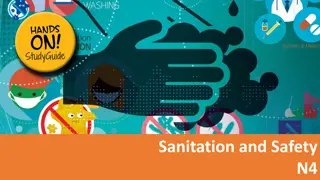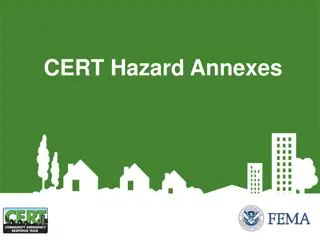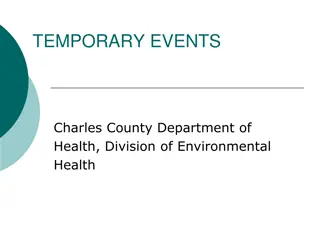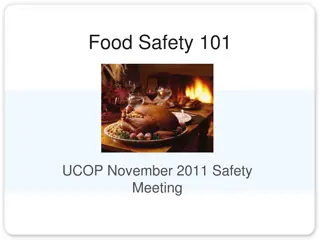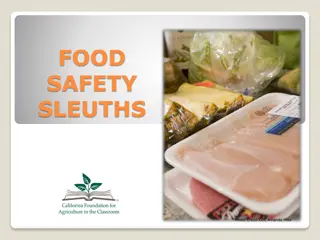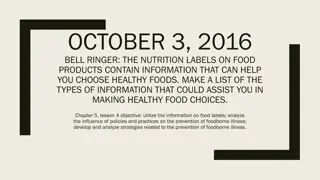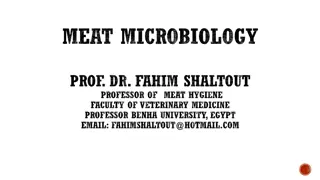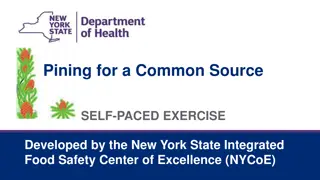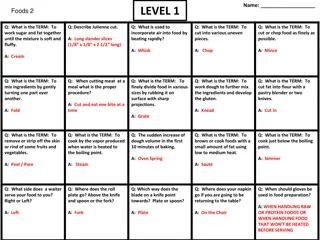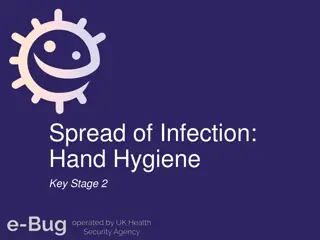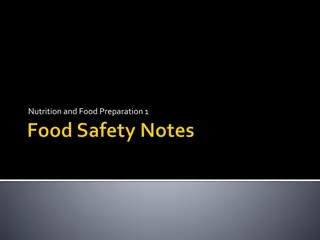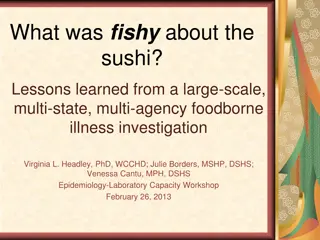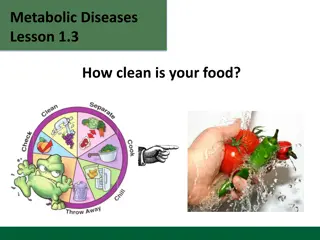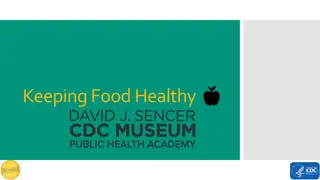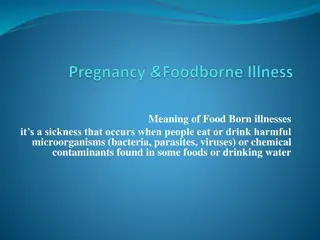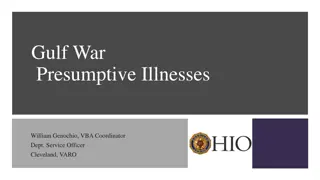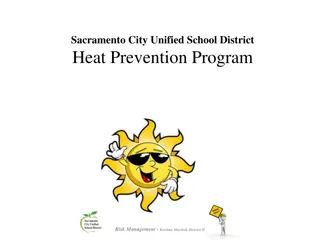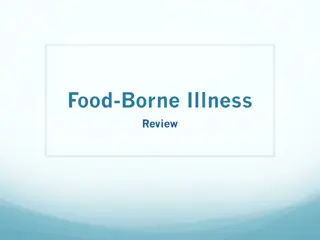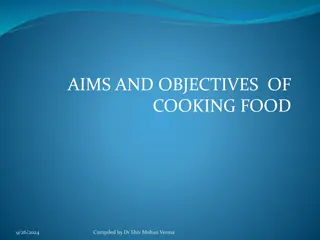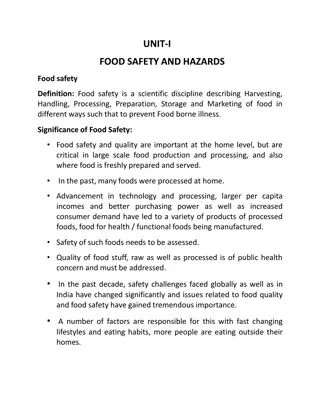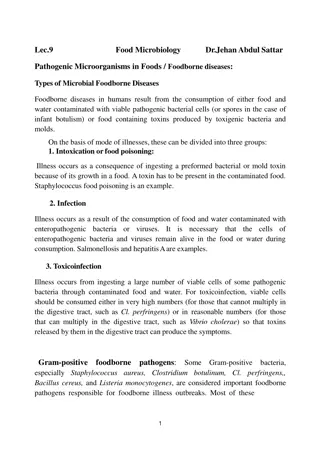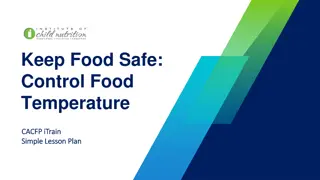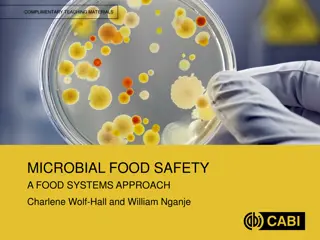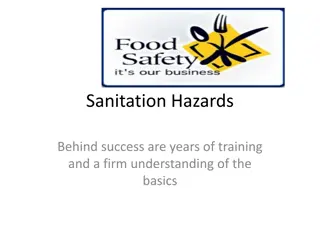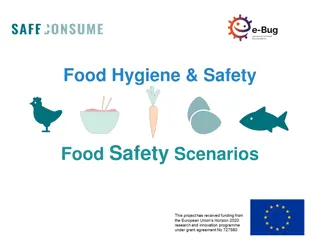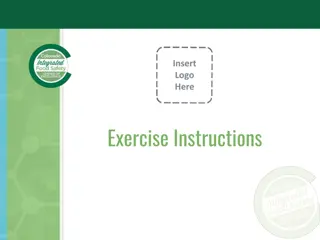Essential Food Safety Training Program in Abu Dhabi
The Essential Food Safety Training (EFST) program in Abu Dhabi is designed to equip food handlers with the knowledge and skills necessary to ensure safe food handling practices. Led by experienced trainers like Navas Khan A., the program covers essential pillars such as avoiding cross-contamination,
2 views • 26 slides
A Risk Factor Study on Food Establishments in Kansas
Explore a risk factor study conducted on food establishments in Kansas by Crystal Futrell, a Kansas State University MPH candidate specializing in Food Safety and Biosecurity. The study delves into the history of the Kansas Department of Agriculture, its various programs related to food safety and l
0 views • 68 slides
Understanding Common Illnesses and Health Advice
Explore various common illnesses like flu, fever, headache, cold, and their symptoms through images. Learn how to describe illnesses using verbs and match symptoms with the right illness. Additionally, discover health advice using "should" and "shouldn't" with appropriate illnesses.
0 views • 18 slides
Understanding Microbiology of Food and Foodborne Diseases
This introduction delves into the world of microbiology in relation to food, exploring key terms such as foodborne diseases, food hygiene, contamination, and more. It covers crucial concepts like toxic-infection, carriers, pathogens, and vectors, shedding light on the importance of food safety pract
1 views • 32 slides
Food Safety Guide for Delivery Drivers of Home-Delivered Meals
This guide emphasizes the importance of food safety for delivery drivers handling home-delivered meals, particularly for vulnerable populations. It covers topics such as temperature control, safe food handling practices, and packaging guidelines to ensure the meals remain safe for consumption. Adher
0 views • 37 slides
Comprehensive Guide to Personal Hygiene in Food Handling
Understanding the importance of personal hygiene in food handling operations is crucial for maintaining a safe environment and preventing contamination. This guide explores the key practices and procedures involved in maintaining high standards of hygiene in food preparation, storage, and handling a
0 views • 30 slides
Safeguarding Your Kitchen: Preventing Cross-Contamination
Cross-contamination poses a risk of foodborne illnesses and can occur in multiple ways, such as using the same utensils for raw and cooked foods. Taking specific cleaning steps at home, like regularly cleaning dish cloths and sanitizing surfaces, is vital to preventing harmful bacteria from spreadin
0 views • 8 slides
Epi-Ready: Investigating Foodborne Outbreaks & Epidemiologic Approaches
In Module 6 of the Epi-Ready Epidemiologic Investigation series, participants learn about epidemiologic approaches in responding to foodborne outbreaks. The module covers methods for information gathering, measures of association, statistical significance, case definitions, surveillance activities,
0 views • 41 slides
Introduction to Cookery in B.Sc. Hotel & Hospitality Management Semester-1
This content covers the basics of cookery, focusing on key aspects such as cross-contamination and personal hygiene in the context of food preparation. It emphasizes the importance of maintaining hygiene standards to prevent foodborne illnesses in the hospitality industry, with guidelines on practic
0 views • 11 slides
Extreme Heat Preparedness and Impacts: CERT Hazard Annexes
Introduction to CERT Hazard Annexes focusing on extreme heat, discussing heat-related illnesses, impacts of extreme heat, and preparedness measures including insulation, window protection, and attic fans. The content emphasizes the preventable nature of heat-related illnesses and the vulnerabilities
0 views • 26 slides
Guidelines for Temporary Food Service Operations at Charles County Events
In Charles County, temporary food service operations are defined as facilities operating with events lasting up to 30 days, requiring a permit from the Department of Health. The process involves submitting an application, meeting minimum requirements like proper waste disposal and food storage, and
1 views • 23 slides
Essential Food Safety Guidelines for a Healthy Kitchen
Learn crucial food safety practices to prevent foodborne illnesses, such as washing hands thoroughly, cleaning and sanitizing utensils, maintaining proper food temperatures, limiting exposure to room temperature, and safe turkey handling tips. Follow these guidelines to ensure the safety of the food
0 views • 10 slides
Understanding Foodborne Illness: Causes and Symptoms
Foodborne illnesses are diseases transmitted to humans through contaminated food, causing symptoms like nausea, vomiting, stomach cramps, fever, and diarrhea. These illnesses are mainly caused by pathogenic microorganisms such as bacteria, viruses, and parasites, often spread through mishandling of
0 views • 10 slides
Understanding Nutrition Labels and Food Safety Practices
Explore the essential information found on food labels to make informed decisions about your diet, while also delving into the importance of food safety practices to prevent foodborne illnesses. Understand the significance of ingredients lists, sugar and fat substitutes, and how to interpret expirat
1 views • 18 slides
Understanding Severe Mental Illness in Mothers: Impacts and Support
Mothers with severe mental illnesses like Schizophrenia face unique challenges in parenting. Support from partners, family, and the community is crucial for their well-being. Despite the difficulties, with proper treatment and support, women with severe mental illnesses can effectively fulfill their
3 views • 23 slides
Understanding Meat Microbiology: Challenges and Growth Phases
Meat microbiology is a crucial aspect of food science, focusing on organisms present in red meat, poultry, fish, and their products. This field addresses both preventing food spoilage and protecting consumers against foodborne illnesses. Challenges arise from slaughtering to home consumption, where
0 views • 124 slides
Foodborne Illness Outbreak Investigation Procedures and Protocols
In this self-paced exercise developed by the New York State Integrated Food Safety Center of Excellence, learners will delve into the intricacies of investigating foodborne illness outbreaks. The course covers topics such as identifying outbreak patterns, roles in outbreak investigations, interpreti
0 views • 171 slides
Culinary Skills and Food Safety Essentials
This content covers a range of culinary knowledge from basic cooking techniques to food safety practices. Topics include culinary terms, measurements conversions, foodborne illnesses, cooking temperatures, kitchen hygiene, and task prioritization. Readers can enhance their cooking skills and learn i
0 views • 6 slides
Importance of Hand Hygiene for Preventing Infections
Understanding the importance of hand hygiene is crucial in preventing the spread of infections. This educational material emphasizes the significance of washing hands to remove harmful microbes and prevent illnesses. Through learning outcomes, curriculum links, and engaging activities like observing
0 views • 35 slides
Importance of Kitchen Safety and Foodborne Illness Prevention
Understanding the significance of kitchen safety and foodborne illness prevention is crucial to maintaining a safe and sanitary cooking environment. This overview delves into the risks associated with improper practices, such as wearing jewelry while cooking, consuming raw cookie dough, and the pote
0 views • 29 slides
Food Safety and Prevention of Food-borne Illnesses
An estimated 48 million Americans suffer from food-borne illnesses yearly, caused by harmful microorganisms due to poor food handling practices. Factors contributing to food-borne illnesses include improper cooking, inadequate storage, and cross-contamination. To prevent such illnesses, it is essent
0 views • 23 slides
Lessons Learned from Large-Scale Foodborne Illness Investigation
This presentation discusses a Salmonella Bareilly outbreak investigation involving sushi in 2012. It covers the roles of various agencies, surveillance methods, and key events during the investigation. The importance of early detection and collaboration in managing foodborne illnesses is highlighted
0 views • 42 slides
Food Safety and Preventing Food-borne Illness
This lesson focuses on the importance of food safety, addressing how clean our food is and at what points safety can be compromised. It delves into common types of microbes that contaminate foods and explores ways in which food safety can be compromised. The activity involves case studies on food sa
0 views • 11 slides
Understanding Food Safety and Preventing Foodborne Illness
Exploring the importance of food safety, this content delves into common bacteria found in human intestines, food recalls, and outbreaks caused by E. coli and Salmonella. It highlights initiatives by CDC in monitoring, detecting, and preventing foodborne diseases, emphasizing the significance of sur
0 views • 16 slides
- Risks of Foodborne Illnesses During Pregnancy
- Pregnant women are at high risk of foodborne illnesses due to weakened immune systems. Such illnesses can lead to serious health issues for both mother and fetus, including miscarriage and premature delivery. Symptoms may include stomach-related discomfort, vomiting, and diarrhea. Immediate medica
0 views • 15 slides
Gulf War Presumptive Illnesses and Eligibility Requirements for Veterans
Gulf War Veterans who served in the Southwest Asia theater of military operations may be entitled to disability compensation for certain undiagnosed illnesses, chronic disability patterns, and presumptive diseases. Eligible Veterans can receive a free Gulf War Registry health exam to identify potent
2 views • 18 slides
Gulf War Veterans Disability Compensation Guide
Qualifying Gulf War veterans may be entitled to disability compensation for certain undiagnosed illnesses, chronic disability patterns, and presumptive diseases. Eligibility requirements include meeting specific conditions related to service-related disabilities or illnesses. The disabilities must f
0 views • 12 slides
Heat Illness Prevention Plan for Sacramento City Unified School District
This plan outlines key elements for preventing heat-related illnesses in the Sacramento City Unified School District. It focuses on providing access to water, shade, training, and emergency response to reduce the risk of heat-related illnesses among employees. The plan includes steps to ensure emplo
0 views • 18 slides
Understanding the Microworld: Factors Affecting Foodborne Pathogens
This chapter delves into the microworld of microorganisms and pathogens that can contaminate food, leading to foodborne illnesses. It covers key terms such as bacteria, viruses, parasites, and fungi, along with topics on preventing contamination, understanding spores, and the temperature danger zone
0 views • 25 slides
Food Safety Review: Preventing Food-Borne Illness
Explore key aspects of food safety including the definition and symptoms of food-borne illnesses, categories of causes, common pathogens like Salmonella and E. coli, personal hygiene practices, proper food storage techniques, and thawing methods. Gain insights into preventing food-borne illnesses th
0 views • 11 slides
Importance of Cooking Food for Health and Palatability
Cooking food is an ancient art that involves the application of heat to enhance digestibility, safety, and flavor. It aims to provide balanced meals, increase palatability, sterilize food partially, extend food preservation, and retain essential nutrients and flavors. Cooking also offers variety to
0 views • 8 slides
Understanding Food Safety: Essential Knowledge and Practices
Exploring the fundamentals of keeping food safe, this content covers topics such as foodborne illnesses, contaminants, food safety responsibilities, key terms like time-temperature abuse and cross-contamination, and high-risk populations. Discover how to identify foodborne illnesses and recognize fa
0 views • 22 slides
Importance of Food Safety in Modern Food Production
Food safety is crucial in modern food production to prevent foodborne illnesses. With advancements in technology and increased demand for processed foods, the need to ensure the safety and quality of food has become paramount. Factors affecting food safety include poor hygiene practices, contaminate
0 views • 30 slides
Understanding Foodborne Diseases and Pathogenic Microorganisms in Foods
Foodborne diseases in humans are caused by consuming contaminated food or water containing pathogenic microorganisms or toxins. These diseases can be categorized into intoxication, infection, and toxicoinfection, each with distinct modes of illness. Pathogens like Staphylococcus aureus, Clostridium
0 views • 5 slides
Food Safety: Control Temperature to Prevent Bacteria Growth
Understand the importance of controlling food temperature to keep it safe from bacteria growth. Learn about the temperature danger zone, where bacteria thrive, and the proper handling procedures for buying, storing, cooking, holding, and reheating food. By following these guidelines, you can ensure
0 views • 17 slides
Importance of Hand Washing in Poultry and Egg Safety
Hand washing plays a crucial role in maintaining poultry and egg safety by preventing harmful bacteria like Salmonella and Campylobacter from spreading. Proper hand washing before and after handling food products, cracking eggs, using the bathroom, touching pets, and more is essential to prevent foo
0 views • 10 slides
Ensuring Food Safety: Traceability in Food Systems
In the world of increased foodborne illnesses and global food trade, the focus on traceability of food sources is crucial to containing outbreaks efficiently and cost-effectively. This guide discusses the importance of traceability, the technologies involved, and the balance between costs and benefi
0 views • 21 slides
Importance of Sanitation in Food Handling
Behind culinary success lies years of training and a solid grasp of food safety basics. Unsafe food handling can lead to foodborne illnesses, outbreaks, and even legal consequences. Sanitation practices are crucial to prevent contamination and ensure food safety in professional kitchens, reducing th
0 views • 8 slides
Food Hygiene & Safety Scenarios: Learning the Importance of Proper Food Handling
Explore three scenarios highlighting the significance of food hygiene and safety. From understanding the consequences of foodborne illnesses to recognizing the importance of following proper food handling practices, these scenarios shed light on critical aspects of food safety. Learn how simple acti
0 views • 7 slides
Investigating Foodborne Illness Outbreaks Linked to Events
An organization is investigating outbreaks of foodborne illnesses associated with two different events: a wedding in Pueblo and the National Western Stock Show. The wedding outbreak involves confirmed cases of Norovirus, affecting several guests, while the stock show outbreak is linked to E. coli O1
0 views • 16 slides

